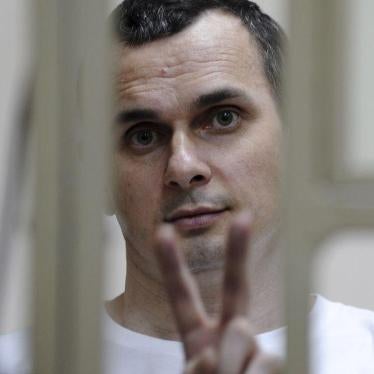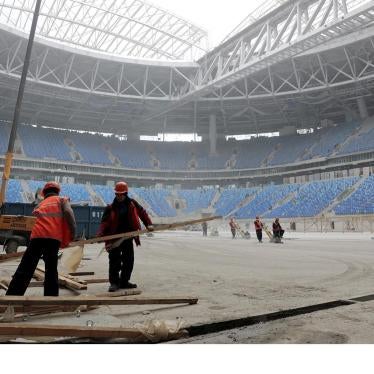July 26, 2017
Mr. Federico Addiechi
Head of Sustainability & Diversity
Fédération Internationale de Football Association (FIFA)
FIFA-Strasse 20
P.O. Box 8044 Zurich
Switzerland
RE: FIFA World Cup 2026 – Human Rights Requirements
Dear Federico,
Human Rights Watch thanks you for giving us the opportunity for feedback on the new human rights requirements of bidding and hosting the World Cup 2026. These requirements are an important step for FIFA, and could serve as a useful model for other world sports organizations.
This is the first time FIFA has required human rights assessments as part of its bidding process, and its revised process and requirements could set a new benchmark for football and beyond. We very much hope for this outcome, but it will all depend on implementation and execution.
According to the proposed requirements under consultation: “As part of the bid, each of the bidders’ proposed stadium, training site, airport, and hotel authorities is requested to enter into an agreement by which they are contractually obliged to respect Internationally Recognized Human Rights in accordance with the UN Guiding Principles in all aspects of their activities relating to the hosting and staging of the Competition, including legacy and post-event related activities, in particular with regard to any specific activities which may create a negative human rights impact in each case.”
The overview you provided mentions many major human rights concerns related to the World Cup, including workers’ rights, discrimination, press freedom, and free speech. In particular, given the track record in many countries, including upcoming World Cup hosts Russia and Qatar, of worker abuses in infrastructure construction, the explicit mention of worker rights is important. However, there are several respects in which the content of “Internationally Recognized Human Rights” and the process for incorporating them into FIFA participation require greater elaboration to ensure success.
I. Properly defining “internationally recognized human rights”
The draft document is an important first step, but appears to rely on a fairly narrow interpretation of the phrase “Internationally Recognized Human Rights,” focusing mainly on workers’ rights and qualifying that this list “may be enlarged” by various other rights in international legal instruments, though no explanation is given of how or when the list “may” or “may not” be so expanded. However, as the document correctly notes, FIFA is committed in Article 3 of its Statutes to respecting “all” internationally recognized human rights. Many such basic freedoms such as freedom to speak, to be free of discrimination, and to associate, are of course interdependent with and essential to many workers’ rights as well.
We therefore recommend adding a more inclusive and clearer definition such as this one:
The phrase “Internationally Recognized Human Rights” includes workers’ rights, as protected by the International Bill of Human Rights and the International Labour Organisation’s Declaration on Fundamental Principles and Rights at Work, and the ILO’s conventions concerning forced labor, collective bargaining, discrimination, child labor, occupational safety and health risks. The phrase also refers to the rights protected by the International Covenant on Civil and Political Rights (ICCPR), the International Covenant on Economic, Social and Cultural Rights, and various other rights protected by international law and United Nations conventions, including the rights of women; children; indigenous peoples; national or ethnic, religious and linguistic minorities; members of the lesbian, gay, bisexual, and transgender (LGBT) community; and persons with disabilities.
We believe that direct reference to the requirements of universal international law is important, and not simply an oblique reference to “Internationally Recognized Human Rights in accordance with the U.N. Guiding Principles, as these laws directly bind both governments and through governments, private organizations. Additionally, we encourage you to include a reference to the additional requirements of regional and national standards as applicable, as well as the standards of the U.N. Guiding Principles, as these are also incumbent on all participants in FIFA and may entail higher standards.
II. Adequately implementing and integrating human rights
Human Rights Watch has documented the long-standing problem of countries pledging to uphold human rights while bidding, preparing for, and hosting mega-sporting events, and then failing to do so. In some cases, mega-sporting events have been catalysts for human rights abuses.
Thus, it is equally important that the bidding, hosting, and contract requirements are integrated fully—meaning that human rights are a central consideration at every stage, and improvements, such as legal reforms and a stronger civil society, are also part of the World Cup legacy. We would welcome more information on, and encourage FIFA to include in this process, clear and meaningful sanctions for non-compliance with human rights commitments, as well as on remediation systems.
III. Specific issues
Sanctions and remedies for non-compliance with human rights requirements
In the July 20 consultation call, FIFA staff noted they “don’t expect issues of non-compliance.” We are concerned that this approach may not fully consider past experience of mega-sporting events and the serious risks of human rights abuses linked to the preparation and hosting of those events. Contractual requirements, to be effective, need to anticipate worst case scenarios and be backed by action. Just as the new bidding and hosting requirements rely on the UN Guiding Principles, they should equally draw on the UN Guiding Principles’ requirements for remediation and transparency in the event of non-compliance with human rights commitments.
We would welcome more information regarding the systems that will be in place to ensure monitoring of implementation of human rights pledges, and specific sanctions and prompt remedies in the event of non-compliance.
Grievance mechanisms
Human Rights Watch is concerned as to the rationale for considering the member association to be the best or only avenue to provide “appropriate and effective grievance mechanisms for individuals and communities whose human rights may be impacted by the Member Association’s own activities in connection with the staging” (section 1, 2iiC). Since the Member Association or Local Organizing Committee may itself be responsible for committing human rights violations or be linked to human rights violations, there is a serious risk of conflict of interest.
The contractual agreements should give FIFA or an outside alternative dispute resolution mechanism the mandate to assess such situations and the authority to implement meaningful sanctions to enforce the outcome of these grievance mechanisms. There should be both sanctions for not cooperating with a relevant grievance mechanism and for failing to remediate the situation that prompted a grievance.
In the event of serious human rights violations, FIFA should be prepared to revoke hosting rights and contractual agreements and should specify this possibility.
Protecting journalists and human rights defenders
Human Rights Watch encourages FIFA to ensure that the bidding and hosting documents produced by governments and organizing committees also explicitly protect journalists and prohibit interference with the work of journalists, human rights defenders, and other civil society, who are often on the front lines of monitoring and exposing abuses, including abuses linked to mega-sporting events.
Articulating the baseline for minimum compliance
In the consultation document, human rights are one of many considerations in the bidding, selection and hosting processes. To ensure compliance, it will be essential for FIFA to articulate a minimum standard for any country to qualify, and to put in place mechanisms and criteria to evaluate whether a country has done enough to mitigate the risks of adverse human rights impact. For example, in the context of Russia and its anti-LGBT laws, FIFA should not only insist that on selection Russia exempt all persons involved in the World Cup from these laws, it should also cite the law and the need to repeal it as an important measure of Russia’s eligibility in the first place.
Articulating clear minimum standards for eligibility, as well as expectations upon selection, would do much to ensure that FIFA is not continually associated with human rights abuses at the later stage of hosting. Given that selected countries have nearly eight years to prepare, real changes can be required so that they may honor their FIFA commitments when the time comes. But the time to articulate these minimum standards is now.
Although the new requirements will only become applicable for countries bidding to host the 2026 FIFA World Cup, we urge FIFA to continue and expand its steps to assess, mitigate, and remediate human rights concerns in Russia and Qatar, and make these efforts public and transparent, in line with the UN Guiding Principles. This will not only avoid problems in these World Cup events, it will signal to future applicant nations that the human rights requirements will be a genuine factor in their evaluation.
We thank you for the opportunity to provide input into FIFA’s new standards, and we hope you take into account Human Rights Watch’s recommendations and concerns.
Please do not hesitate to contact me for further information or clarification on any of these recommendations.
Sincerely,
Minky Worden
Director of Global Initiatives
Human Rights Watch






